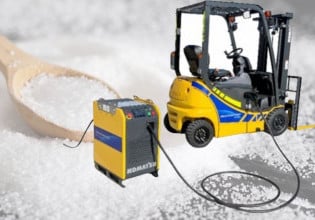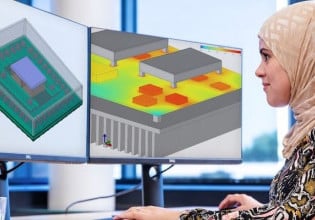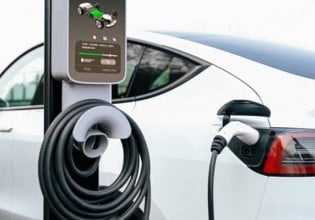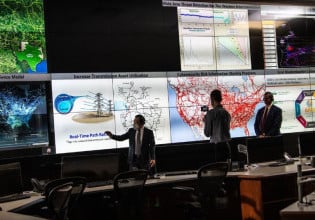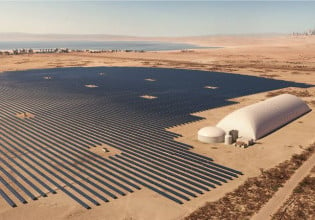Carbon Battery Charges in Seconds with 5X Energy Density of Ultracaps
NAWA Technologies, a pioneering company based in the south of France, has developed the next generation of battery, an innovative solution that sets new standards for charging speed, frequency and environmental friendliness.
Called the Ultra Fast Carbon Battery, NAWA Technologies' energy storage solution can be charged and discharged within seconds. And it can do so over a million cycles without any loss in performance, far in advance of conventional lithium-ion batteries which take minutes, sometimes hours, to fully charge and typically have 5,000 cycle limits.
Based on the principle of the ultracapacitor, NAWA Technologies' Ultra Fast Carbon Battery takes existing technology to the next level, capable of storing up to five times more energy than existing ultracapacitors. Features include:
- NAWA Technologies has developed a new generation of batteries that can be recharged in seconds for up to a million cycles
- More efficient and powerful than lithium-ion cells, NAWA Technologies' Ultra Fast Carbon Batteries are also safer and more eco-friendly to manufacture
- Based on the principle of the ultracapacitor, NAWA Technologies' Ultra Fast Carbon Batteries feature vertically aligned carbon nanotube electrodes
- NAWA Technologies has pioneered a unique coating for these nanotubes and as a result its batteries can offer five times higher power density than existing ultracapacitors
- NAWA Technologies has also pioneered a specialized nano-manufacturing process and has entered low volume pilot manufacturing
- Key markets for Ultra Fast Carbon Batteries include automotive, industrial, defence, aerospace, power tool and personal mobility
- NAWA Technologies' innovations could also play a key role in managing energy across the smart electricity grid
Carbon is NAWA Technologies' material of choice because it is abundant, accessible and natural. The company's manufacturing process minimizes the environmental impact while its products all have a second life and are recyclable. Because NAWA Technologies Ultra Fast Carbon Batteries are carbon-based, they do not suffer the same thermal issues as conventional storage systems.
There is a significant difference in the way the batteries store electricity too. In a regular ultracapacitor, there is a purely electrostatic reaction, while with a lithium-ion battery there is a purely chemical reaction.
NAWA Technologies' combination of vertically aligned carbon nanotubes, a unique coating and a chemical electrolyte, allows its Ultra Fast Carbon Batteries to sit between regular ultracapacitors and lithium-ion batteries, offering huge potential.
That means higher-energy density and higher-power than regular ultracapacitors. They are also cleaner, safer, more reliable and kinder to the environment than current storage systems.
NAWA Technologies has its own low volume pilot production line and a range of products. NAWACAP Energy can store three to five times more energy than current ultracapacitors while retaining the same power characteristics. NAWACAP Power achieves power densities more than five times higher than existing ultracapacitors.
AWASHELL is a highly innovative mechanical composite structure capable of storing energy. Applied to a smartphone case, for example, this project could change the way energy is stored across the globe.
In the short term, NAWA Technologies' new Ultra Fast Carbon Batteries offer two major solutions. As replacements for existing ultracapacitors, they enable faster charging of electricity. When combined with existing lithium-ion batteries - which boast greater energy density - or hydrogen fuel cells, they can provide more power and extend a product's lifetime.
In the long term, the possibilities offered by NAWA Technologies' Ultra Fast Carbon Battery could enable the company to develop hybrid ultracapacitor cells with energy densities approaching those of lithium-ion batteries but with much faster charging times.
NAWA Technologies' Ultra Fast Carbon Batteries are perfect for use in the automotive industry in hybrid cars where they can, for example, rapidly store (and deploy) energy from regenerative braking systems. Other applications include logistics, where faster, more rechargeable electric storage devices with longer lives are ideal for fleets of factory or warehouse-based vehicles.
Urban mobility is another key area. In tomorrow's intelligent cities, NAWA Technologies' batteries are ideally suited for autonomous vehicles (such as buses or shared cars) which can be recharged in a few seconds when vehicles are at rest. Furthermore, NAWA Technologies' concepts are ideally suited to regulating tomorrow's smart electricity grids, which will have an increased reliance on renewable, more variable energy.
Pascal Boulanger, COO of NAWA Technologies, said: "With our new Ultra Fast Carbon Battery, we have combined the best nanotechnology with the best clean technology. We have a ground-breaking battery that stores more electricity, more rapidly - and it is safer, more reliable and kinder to the environment than current storage systems. What is really exciting is the sheer potential of ultracapacitors.
"The world is becoming increasingly electrified and we see several markets open to NAWA Technologies. Products powered solely by Ultra Fast Carbon Batteries, such as powertools and electric bikes, but also our technology combined with lithium-ion. Take an electric or hybrid car, for example. Ultra Fast Carbon Batteries are capable of accelerating that car, reducing the number lithium-ion cells required, reducing the car's weight and extending its performance and range.
"Then there's our NAWASHELL technology, which is capable of revolutionizing the way we look at energy storage. NAWA Technologies can change the way people relate to electricity: not consuming too much, but consuming better in a more virtuous way - just what you need, whenever you need, wherever you need."
Ludovic Eveillard, Sales and Marketing VP of NAWA Technologies, said: "We are at a pivotal moment in the industry. Our Ultra Fast Carbon Battery can expand traditional ultracapacitor markets and play in completely new spaces. That is very exciting indeed."
Harald Hauf, Technical Director of NAWA Technologies, said: "A key breakthrough has been the pioneering development of our nano-manufacturing process which has lead us to low volume production, something no other company has achieved. We are well on the road to full industrialization."
Ulrik Grape, CEO of NAWA Technologies, said: "I was attracted to NAWA Technologies by the combination of the potential of the ultracapacitor technology the company has developed with a proprietary manufacturing process that will make the technology highly competitive in the energy storage space.
What is so exciting is the positioning of this pioneering new technology, Ultra Fast Carbon Batteries sit between regular ultracapacitors and lithium-ion batteries, offering huge potential. Pascal and the company's strong team of engineers have driven the technology to a market ready product and I am excited to join this team and drive it to market entry and commercial success," concluded Grape.


